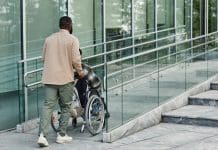Researchers at Seoul National University of Science and Technology have conducted research into the role of gender in crime anxiety in piloti parking spaces
Virtual reality was used to conduct the study into gender-responsive urban planning.
Specifically, the research concerned piloti parking spaces, or parking areas with pilotis pillars supporting the building above.
Piloti parking areas often have design flaws making them dangerous
The study states that piloti parking areas are a risk for pedestrians and any residents of the building to navigate due to the pillars reducing visibility, the lack of clear boundaries, and poor management, such as blind spots which criminals can use.
Researchers at the School of Architecture at the university investigated how various architectural configurations of piloti parking spaces and their surrounding streets impacted the fear of crime in men and women using virtual reality (VR).
28 scenarios were created in VR for 85 participants, showing different entrances, boundaries, structures, and lighting configurations. Each participant would navigate four of these scenarios and then complete a questionnaire within the virtual environment that assessed visibility and safety.
Men and women prioritised different aspects of visibility in gender-responsive urban planning
The study found that men’s visibility and feeling of safety tended to be reduced by any obstruction to the view of their surroundings, such as views to the surrounding streets being blocked by walls or pillars.
Women, on the other hand, tended to be more impacted by blind spots created by architectural features such as walls or side entrances, creating areas that could hold unexpected threats in their more immediate vicinity.
Some examples of features that made women feel safer are transparent or plant fences.
Personal history was also taken into account for each participant, with men more often living in buildings that have piloti parking spaces, thereby making them feel safer, while women will also be more likely to have past experiences of victimisation that increases their crime anxiety.
Assistant professor So Yeon Park, from the School of Architecture at Seoul National University of Science and Technology, said: “We also propose design strategies for improving the environment of piloti parking areas and reducing users’ fear of crime.
“Consistent with previous studies, perceived visibility significantly reduced fear of crime for both genders. However, men and women prioritised different aspects of visibility.
“Design strategies like having unobstructed visibility can reduce crime anxiety among men, while having transparent or low-height tree fences and minimizing blind spots can mitigate women’s fear and increase surveillance.”














